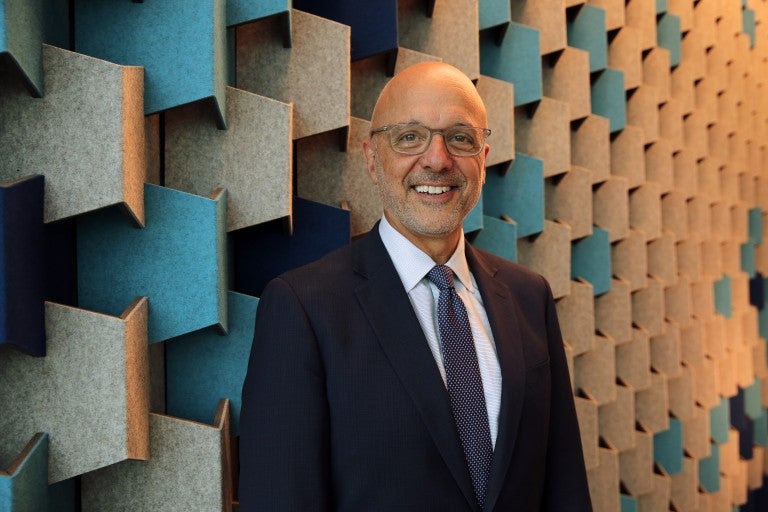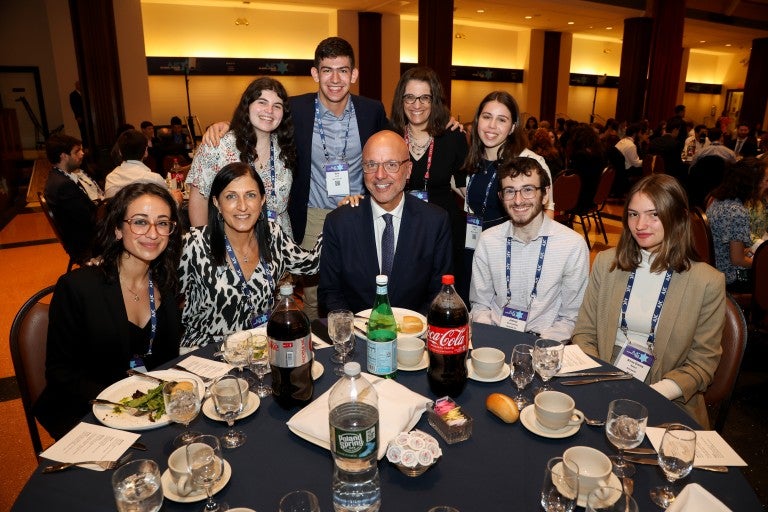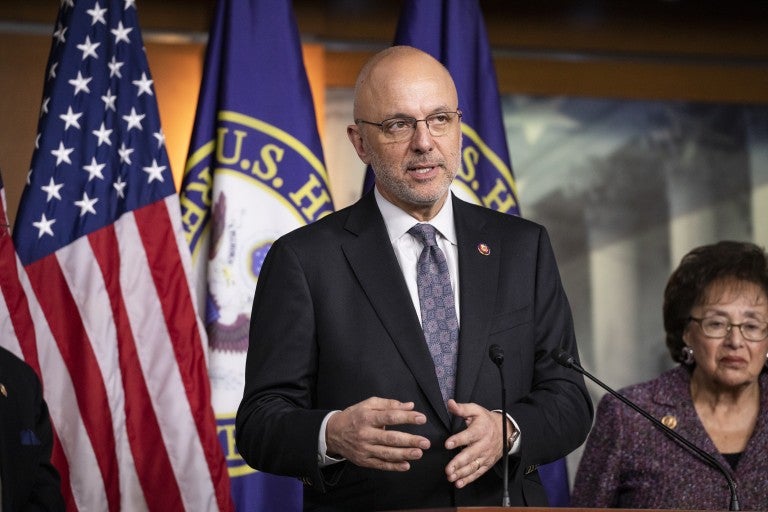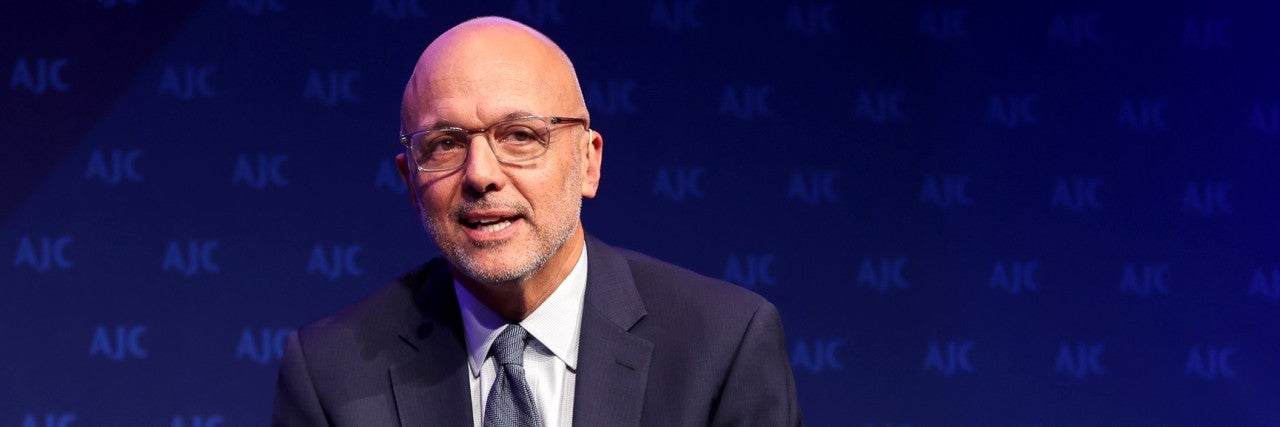October 1, 2022
Over the course of 11 days in May 2021, Israel’s Iron Dome rocket defense system intercepted thousands of rockets fired by terrorists from the Hamas-controlled Gaza Strip determined to kill innocent civilians and devastate Israel’s major cities.
Four months later, then-U.S. Rep. Ted Deutch, who is now the CEO of American Jewish Committee (AJC), prepared a speech to deliver on the floor of Congress about America’s moral obligation. Replenishing an American ally’s defensive system and standing up against terror was imperative. Instead, Ted found himself standing up to his colleague, Rep. Rashida Tlaib of Michigan, who opposed the life-saving measure and had the gall to call Israel’s government an apartheid regime. The slander was more than he could bear. So, he set aside his remarks and spoke from the heart.
“I cannot allow one of my colleagues to stand on the floor of the House of Representatives and label the Jewish democratic State of Israel an apartheid state. I reject it,” he proclaimed before members of Congress. “To falsely characterize the State of Israel is consistent with those… who advocate for the dismantling of the one Jewish state in the world. And when there is no place on the map for one Jewish state, that’s antisemitism.”
For more than 12 years on Capitol Hill, Ted was a powerful voice for the Jewish people, a champion of the Jewish state, and a defender of democratic values. But he’s always seen that as his charge, whether as a congressman, colleague, or father. It’s why he fought in Congress to fortify the bipartisan U.S.-Israel alliance. It’s why he called out antisemitism on both sides of the political aisle. It’s why instead of running for an eighth term, he has channeled his relentless advocacy for the Jewish people and Israel into a new role at the helm of the premier global Jewish advocacy organization, AJC.
“His Jewish identity permeates all that he does,” said U.S. Rep. Brad Schneider of Illinois. “The generations that came to awareness within their Jewish identity post-1967 know Israel in a certain way. They’ve seen the evolution of the U.S.-Israel relationship in a very distinct way…. As AJC moves to its next chapter and next generation, Ted is going to speak with a voice that reflects that generation.”
‘He’s tough and he’s not going to back down from a fight’
The youngest of five children in Bethlehem, Pennsylvania, Ted grew up in a patriotic pocket of working-class America where public-school students either graduated from Freedom or Liberty High School. Of more than 2,000 students, he was one of only three in his school who were openly Jewish. He rode his bicycle to the magic store after school and played basketball at the local Jewish Community Center that also housed his family’s Conservative synagogue.
A few neighborhoods in town barred Jews from homeownership, and he occasionally encountered other examples of antisemitism. In those moments, his father, who earned a Purple Heart for fighting the Nazis at the Battle of the Bulge in World War II, would share stories of how he balanced his American and Jewish pride. Ted still has the prayer book his father carried throughout the war. Inside, one page has a small tear down the middle where, as a soldier, he carved out a shin, the Hebrew letter customarily inscribed on the doorpost of a Jewish home as a sign of faith.
“This was what he taped above his bunk when he was in the Army, and it was his way of having a little mezuzah just to reflect the fact that here's a Jewish soldier who was there as an American and as a Jew,” Ted said.

Ted was 12 years old when his synagogue’s new rabbi decided to invest in his congregation’s young Jews and send them to Camp Ramah, an overnight Jewish summer camp in the Poconos. There, amid forested peaks, Ted was immersed in a Jewish community, the likes of which he had never known. Campers forged ironclad friendships and learned to watch out for one another – the Jewish principle of Kol Yisrael arevim zeh bazeh. His lifelong friend and bunkmate Steve Goldberg said no one took that responsibility more seriously than young Ted.
One night when Ted fell ill before a long-anticipated raid on another bunk, he insisted on playing lookout from his cot, flashing signals to his teammates in the cover of darkness. A silly memory, yes, but it comes back to Goldberg every time he sees his friend still looking out for the Jewish community.
“He’s tough and he’s not going to back down from a fight,” Goldberg said. “He’s not going to take no for an answer when he feels that’s the wrong response for whomever he’s dealing with. He’s an advocate for Jews, an advocate for Israel and he’s going to be fierce. But he also has that kindness and compassion. He can relate to people going through tough times and Jews are going through tough times.”
Building the pro-Israel community among young American Jews
Ted’s new role as CEO comes at a crucial time for AJC, which has ramped up its outreach to young people over the past several years, adding divisions that focus on high school students as well as university faculty and administrators. Efforts to delegitimize Israel have seen the most success on college campuses where the antisemitic Boycott, Divestment, and Sanctions (BDS) movement has been falsely framed by critics of Israel as a social justice opportunity to stand up for an oppressed minority – the Palestinians. On campuses across the country, pro-Israel students have been barred from clubs, denied letters of recommendation, cyberbullied, and harassed.
“There are young people who have been so engaged on their campuses, on social media, sometimes feeling like they’re on an island,” Ted said in a recent interview. “Providing a real home for them to come together, to confront these issues that they’re facing, to help them understand what we can do to change the narrative by lifting up their voices, that’s the moment that we’re in.”
A father of three children in their 20s, Ted knows firsthand that some in their generation have legitimate concerns about Israel’s imperfections. “My dad sees people in the Jewish community who are disengaged, who have legitimate criticisms of Israel, and he wants to engage them,” said his daughter Gabby Deutch, 27, a reporter for Jewish Insider. “He wants to try to understand them so that we can address their concerns. But he comes at it from an inherently optimistic place in terms of the direction things can go, believing things can get better, believing better things are already happening.”

Ted also knows many of his children’s peers lack a comprehensive education about Israel, its challenges, and its significance for the Jewish people.
After graduating from college in Tennessee, Serena Deutch, 27, moved to New Orleans where the Jewish community pales in size compared to Boca Raton. The lessons from her father’s upbringing in Bethlehem have helped her drive her own Jewish experience. She agrees that his intention of casting a wide net will harness untapped energy among her social justice-oriented peers.
“Jewish advocacy is not the number one issue for most of them,” she said. “I feel really lucky that from a young age I grew up empowered by Judaism and empowered to forge my own path and what that looked like.”
Ted believes progress can be made if more people experience Israel. When Camp Ramah gave him that opportunity before his senior year in high school, he checked off all the first-time milestones, praying at the Kotel and planting a tree. But it was his conversations with Israelis that cemented – and continue to affirm – his devotion to the Jewish state.
“That I think is really important to do every time we visit,” Ted said. “It’s not just about looking at sites, but to actually understand the connection that we have with people who live in Israel.”
Ted’s children, twin sisters Gabby and Serena, and their brother Cole, now 23, first experienced Israel when the sisters celebrated their B'nai Mitzvah. They all followed in their father’s footsteps and returned later with Camp Ramah.
Cole went on to help lead a trip to Israel for a diverse group of 18 student leaders at the University of Texas, one year after the student government soundly defeated a BDS resolution. Upon arriving in Tel Aviv, he recalls one student exclaiming “Wow, I thought it was going to be tents in the desert.”
“When you’re a college student, you think about it in such black and white terms,” Cole said. “When you’re there you meet Israeli Jews, Israeli Arabs, Palestinians. Just seeing the humanity there, people realize it’s an important place with deep issues.”

Ted cultivated his own advocacy on Jewish issues, Jewish values, and Israel at the University of Michigan in Ann Arbor. In addition to being active in the campus Hillel, he co-edited Consider, a weekly publication that made a point of soliciting at least two compelling opinions on the issues of the day – a very Jewish notion, he said.
But when it came to issues such as freeing Soviet Jewry and ending apartheid in South Africa, Ted knew where to draw the line, stop fostering conversation, and advocate for one side. His advocacy against apartheid is why he finds it particularly offensive that people misleadingly label Israel an apartheid regime.
He met his wife Jill during college in Michigan. She credits him for introducing her to Jewish advocacy and has since discovered that for many Jews, it is how they fulfill their ethical obligation, or tzedakah. It’s certainly part and parcel of the Deutch family’s faith.
“He is a happy warrior,” said Jill, now a fundraiser for Hillel in South Florida. “While it might seem those two words are in contrast to one another, it’s true. He believes what he’s doing is so important.”
Jill pursued masters’ degrees in Jewish studies and organizational social work in Baltimore, while Ted earned a law degree in Ann Arbor. After they married, they moved to Washington, D.C., then to Cleveland to be closer to Jill’s family. When Ted’s older brother invited him to come work for his firm in Boca Raton, it was an offer they couldn’t refuse. With twin toddlers and a son on the way, the family moved to South Florida in 1998.
‘Tikkun Olam and the importance of being involved in the community’
A meaningful encounter in 2003 with a presidential candidate passing through Florida inspired Ted to enter politics. During the month of Elul on the Hebrew calendar, when Jews prepare for Rosh Hashanah and Yom Kippur, former U.S. Sen. Joseph Lieberman made a campaign stop in South Florida. As a campaign volunteer, Ted hosted the senator overnight in his family’s home. Lieberman emerged in the morning with a shofar that he blew at the kitchen table. That moment and their conversations about public service left a lasting impression on him.
“We often talk about Tikkun Olam and the importance of being involved in our community,” Ted said. “He added to that the importance of being involved in politics and how that's a natural continuation of the same Jewish values that inspire all of us to be involved in our community.”
Soon after Lieberman left, the state senator in Ted’s district decided to run for U.S. Congress, prompting him to make the jump into politics. After winning his seat, Ted spearheaded legislation to make Florida the first state in the U.S. to divest from companies that supported Iran’s nuclear weapons program. In 2010 another opportunity arose when former Congressman Robert Wexler stepped aside, opening the door for Ted to run for Florida’s 19th congressional district, one of the largest Jewish constituencies in the country.
“When I talked about the things that matter deeply to me in the context of the U.S.-Israel relationship and the way I feel about Israel, I knew that I was speaking the same language as so many of my constituents,” he said.
As a member of Congress, Ted became well-known for his ability to reach across party lines to achieve positive results and for the relationships he formed with U.S. and global leaders across the political spectrum.
In 2015, he joined seven of his House colleagues to co-found the Bipartisan Congressional Task Force for Combating Antisemitism to ensure that Congress plays an integral role in condemning antisemitism and promoting tolerance worldwide.
On a trip to Germany, he met with then-Chancellor Angela Merkel to discuss additional Holocaust reparations and also co-sponsored a House resolution with U.S. Rep. Ileana Ros-Lehtinen of Florida, urging the German government to “reaffirm its commitment” to Holocaust survivors in their final years by providing for mental health, medical, and home care needs. Together, he and Ros-Lehtinen also proposed sanctions for foreign support of international terrorism linked to Hamas, Hezbollah, and Palestinian Islamic Jihad, and called for the release of Americans detained in Iran.

As chair of the House Subcommittee on the Middle East, North Africa, and Global Counterterrorism, Ted introduced resolutions condemning the use of human shields by Hamas and co-sponsored the Sudan Peace, Security, and Accountability Act, which called on the administration to address the humanitarian and human rights crises there. He also defied partisan expectations as one of 25 Democrats who voted against the Obama administration’s Iran nuclear deal in 2015, and then as an early supporter of the Trump administration’s Abraham Accords.
“At a time when partisanship rages, we can't allow fighting antisemitism to fall prey to that partisanship,” Ted said. “And likewise, the U.S.-Israel relationship shouldn't fall prey to partisanship. That means being very clear when people who, for partisan reasons or anything else, take positions that are outside of the broad consensus that has existed and continues to exist in Congress and in America that we should support our allies.”
Ted worked to prevent partisanship on other issues too. When he and former Republican Congressman Carlos Curbelo launched the Climate Solutions Caucus, they stipulated that any Democrat or Republican who wanted to join had to extend a hand across the aisle and bring along a colleague from the other side, a strategy coined “Noah’s Ark.”
‘He carries this love for Israel and respect for his Jewish faith’
Ros-Lehtinen, who left Congress in 2019, said she truly grasped Israel’s significance to Ted and the Jewish people during a trip with Ted and Jill in June 2014. While there, the bodies of three Israeli teenagers – Gilad Shaer, Naftali Fraenkel, and Eyal Yifrach – were found after a two-week search. Vigils had been held across Israel and America in hopes that the three teens, abducted on their way home from religious school by Palestinian terrorists linked to Hamas, would be found alive. They rearranged their schedules to sit shiva with the teens’ families.
“That trip crystallized for me that he carries this love for Israel and respect for his Jewish faith so deep in his heart,” she said. “It was a very moving trip for both of us and Jill as well. That really moved me how he was grieving just as the nation was grieving.”
Ted believed paying respects to the Israeli families on behalf of the U.S. and the Jewish community was the right thing to do. He was less sure about visiting families after a gunman opened fire at a high school in Parkland, Florida, on Feb. 14, 2018, killing 17 students and staff. In fact, at one home, a father met him in the driveway and told him to stay away. But after learning more about why Ted and Jill were there, he allowed them inside.
“That's a moment when emotion is the rawest that it can possibly be and, in both cases, we just did what we're taught to do at shiva: we sat and we listened. We listened to stories about the young lives cut short and all the things that these kids had done in their short lives, and all the things that they would have done if they hadn't been killed. There are a lot of similarities. Coming out of both of those is the rededication to the important work,” he said.
At AJC, Ted seeks to fight the conspiracy theories and extremist ideology that are behind the rising violence and antisemitism around the world.
“If we're not talking about the threat, then it's going to make it a whole lot harder for all of us who want to prevent these things from happening to succeed,” Ted said. “We need to be clear that the threats that rising antisemitism poses are threats to the entire community. By tackling antisemitism, we’re helping to create a safer world for everyone.”


